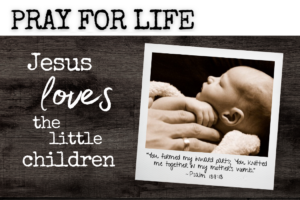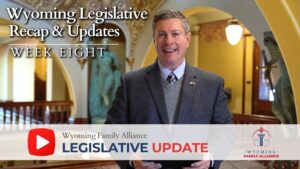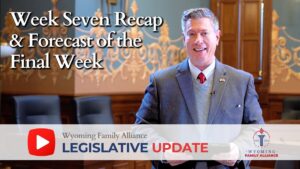By Nathan Winters, President & CEO of Wyoming Family Alliance
Every Memorial Day, many of us stop to consider the price of freedom, often within our own families.
This really struck home this week as I sat in line to board my plane at the Reagan International Airport in Washington, DC.
I sat beside a young man who had just graduated from Advanced Infantry Training in the Army. Like so many young men who blossom under words of affirmation when they are doing big things, as I spoke with this young Private First Class heading out to his assignment in Texas, he opened up with just a few questions.
What struck me as I talked to this 19- or 20-year-old man, who was a little nervous but excited, is that he was likely the same age as my grandad when he headed out to the Pacific theater in World War II.
My grandad grew up on a pretty good-sized farm in the middle of nowhere, Arkansas. As a teenager, he was really good with large equipment and was even hired to help grade the local county road while he was in high school.
December 7th, 1941, shocked the nation, and America went to war. When he got old enough, Grandaddy did too.
He signed up for the Navy, and when they found out what he could do, they assigned him to the Navy Seabees and stuck him on a road-grader. He used to joke that he just did farm work on the other side of the globe.
Truth be told, it wasn’t anything near that easy. After training, he shipped out of Long Beach, California, on April 25th, 1944. After a brief stop in Pearl Harbor in May of that year to pick up supplies, they headed directly to the island of Saipan.
The main battle was over, but even as they rebuilt the runways, roads, and bridges, Japanese snipers would pop out of hiding, and he lost several teammates this way. He then shipped out of Saipan to Okinawa.
The Japanese have called the Battle of Okinawa “Tetsu no Bofu” or the Typhoon of Steel. There were some 50,000 Allied casualties and around 100,000 Japanese casualties. Sadly, according to local authorities, at least 149,425 Okinawan people were either killed outright, died by coerced suicide, or were simply missing when the battle was over.
I don’t know all that he saw, but I do know that for the rest of his life, he would sit up in bed in the middle of the night covered in sweat. When my dad was older, he asked my Grandad what woke him up. Grandad told about being able to see the face, the same face, night after night, of a Japanese man who popped out of a spider hole that had just been uncovered by a road grader and aimed a rifle at him before he was cut down.
The strange thing is, after my grandad passed, my grandmother would scream almost every night at about the same time my grandad would have woken up. Two people carrying the scars of war long past.
Grandad ended the war at a hospital in Hawaii, near death. He had contracted a disease from the jungles that left him in the hospital for nearly two months before he was sent home at the end of the war.
In 1986, at the age of 62, Granddaddy got sick and, within 5 weeks, died because of a weakened immune system and the scars in his lungs. A late casualty of a great war.
Stories like these are known in many American families because the American soldier has lifted the lamp of liberty on many distant shores. I believe that in the annals of world history, there is no title that has meant more to the cause of freedom than that of the American Warrior.
The Army, Navy, Air Force, Marine Corps, Coast Guard, and those silent ones who have given their lives in clandestine warfare opposing evil in this world are heroes, and I want my children to know.
Thankfully, many of them walk among us. But there are some who never made it back home. Today, we honor them.
This Memorial Day weekend, it is fitting that we remember.





